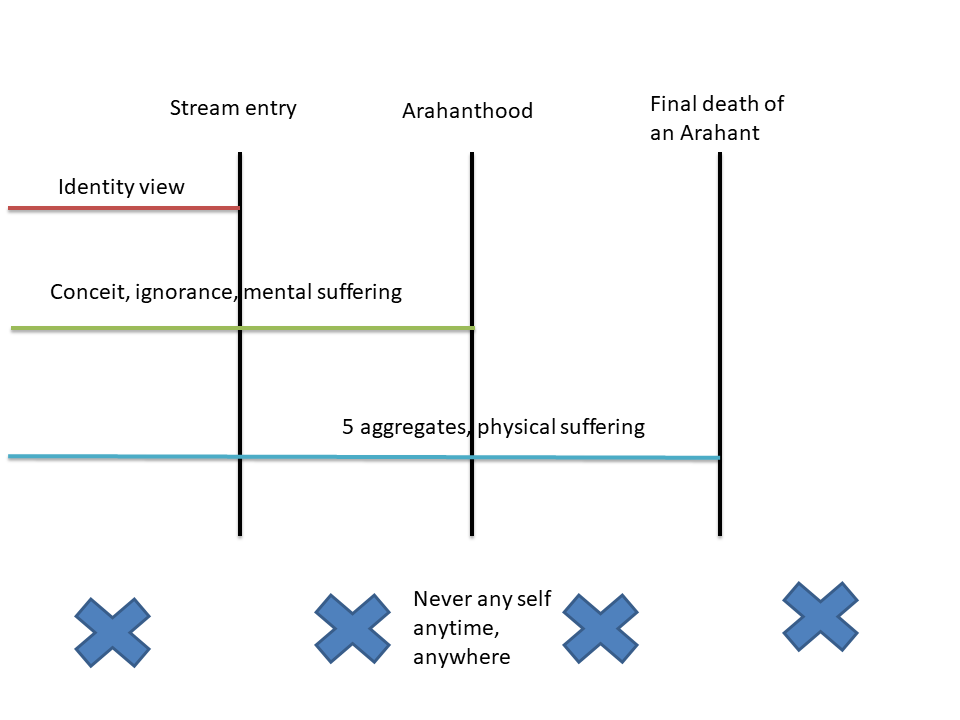Perhaps this is what I mean when I say mahayana claims further into seeing emptiness of all things, not just the emptiness of self.
Anyway, from my interactions with a mahayana practitioner, it seems to me that they think the change, cessation etc are all concepts of the mind imposing onto the world. And once these concepts are seen as empty, the world is not describable by any concepts, then all concepts can be dropped and one is not trapped by concepts. What remains are just the 6 sense contacts. But since the notion of arising and ceasing are gone with the concepts, they don’t regard these pure experience of 6 sense contacts as arising or ceasing, but as empty of anything conceptually imposed onto it.
Yet such a profound state still misses out on the notion that there’s still conditionality for the experience of the 6 sense contacts.
What is meant by all cease is the 6 sense contacts all cease at the breaking up of the body of an arahant. I think viewing in 6 sense contacts is easier perhaps.
Since we don’t claim the dead body of an arhant can still have the 5 physical senses functioning, it is by that it is meant that the body is gone, disappeared, ceases for the arahant. And same too, to know the mind, there must be a 6th sense contact of the mind. When it ceases, there’s no mind to be known. But the mind sense is itself made of mind, and how does it cease, but when the mind doesn’t regenerate into the next rebirth for arahants.
Since there are conditionalities for the 6 sense bases to arise, namely name and form, which is dependent on consciousness, and for the living arahant is only dependent back on name and form, no longer going to be reproduced by the earlier links (except for past unripened kamma) of ignorance.
When the arhant’s body breaks up, the name and form, breaks up and no longer is in synergy with consciousness, the mind-body died the final death, there’s no more basis for 6 sense bases and contact, no more feelings and so on. This is meant by total cessation.
What matter does, due to the laws of physics and so on is not within the concern of Buddhism. The corpse can and does exist all it wants, but it’s of no consequences to the reality of that there’s nothing left after the death of an arahant, as there’s no 6 sense contacts to know of anything left.
This is similar to the formless and cessation absorption. When going into formless absorption, the body is left behind, (for deep Jhāna, from 1st Jhāna onwards already no more physical sense), but of course, externally, the body is still there. But internally, there is nothing of the form realm, then going to the cessation, even the mind ceases. Thus that’s basically the closest to Parinibbāna for the living arahant and non returner.
I remember from ajahn brahm retreats he gave to lay people, that the Jhānas are more letting go, and going deeper, until there’s nothing left, disappear, then emerging back from it, one can reflect what’s not there, to know that whatever is not there is not self, as it there is the notion of self is permanent, always there. When everything is gone, there’s nothing to be known as the self.
Ajahn Chah also gave him the story of asking him why after ajahn brahm had a good meditation. Ajahn brahm replied, I dunno. Ajahn Chah said, because there is nothing. Do you understand? Ajahn brahm replied, yes. Ajahn chah said, no you don’t.
Then ajahn brahm likes to mess with us, do you understand? when the participants reply yes, he would say, no you don’t.
Good laugh.
It’s deep. Even some monks with years of experience still haven’t get it (referring to ajahn brahm when ajahn chah gave that teaching to young ajahn brahm). Don’t expect to accept this easily. The delusion of self would fight a lot to oppose this.
Going back to cessation absorption, that’s basically a bit different from Parinibbāna as in Parinibbāna, the corpse doesn’t cause the mind to arise again. Whereas for the living arahant in cessation absorption, the living body still brings back the mind of the arahant. In this way too, it can be seen that after Parinibbāna, there’s total cessation in that the corpse is not the same as the living body.
